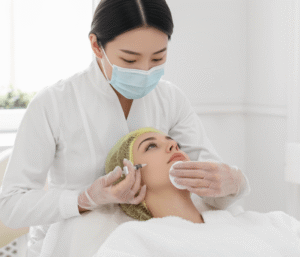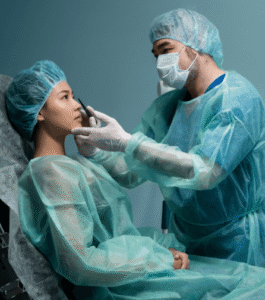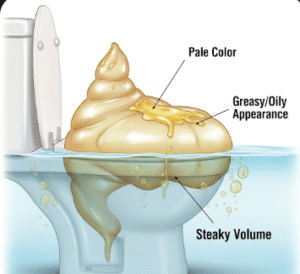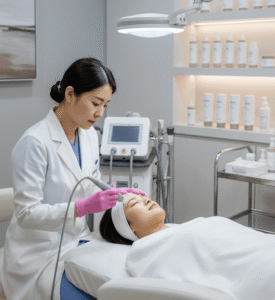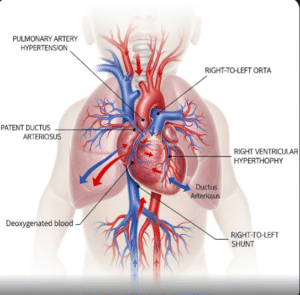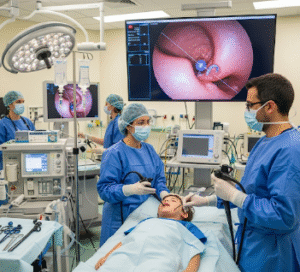Overview
Premature ejaculation (PE) is a sexual dysfunction in men characterized by ejaculation that occurs sooner than desired during sexual activity, often leading to distress, frustration, and interpersonal difficulties. It is one of the most common male sexual complaints, affecting men of all ages but particularly younger adults.
PE can be classified as primary (lifelong) or secondary (acquired later in life). While it is usually not physically harmful, it can significantly impact psychological well-being, self-esteem, and relationship satisfaction. In Korea, advanced urology and sexual health clinics provide comprehensive evaluation, counseling, and treatment options, including behavioral therapy, medications, and minimally invasive procedures.
➤ Ejaculation occurring earlier than desired during sexual activity
➤ Can cause emotional distress and affect relationships
➤ Early assessment improves management and sexual health
Key Facts
➤ Premature ejaculation affects 20–30% of men worldwide, with varying severity.
➤ It can be lifelong (primary) or acquired (secondary) due to medical or psychological factors.
➤ Common symptoms include rapid ejaculation, inability to delay climax, and reduced sexual satisfaction.
➤ PE can coexist with erectile dysfunction, anxiety, or depression.
➤ Korean clinics offer multidisciplinary management combining behavioral therapy, pharmacological treatment, and couple counseling.
What is Premature Ejaculation?
Premature ejaculation is defined as ejaculation that occurs sooner than a man or his partner would like, typically within one minute of vaginal penetration, although the exact threshold may vary.
Types of PE include:
➤ Primary (Lifelong) PE:
➤ Present from first sexual experience.
➤ Often linked to biological factors such as serotonin receptor sensitivity or penile hypersensitivity.
➤ Secondary (Acquired) PE:
➤ Develops after a period of normal sexual function.
➤ Often related to psychological stress, anxiety, erectile dysfunction, or medical conditions.
➤ Situational PE:
➤ Occurs under specific circumstances, such as new sexual partners or stress-related situations.
What Symptoms Are Related To
PE may present alone or with additional symptoms affecting sexual health and emotional well-being:
➤ Rapid ejaculation consistently sooner than desired.
➤ Inability to delay ejaculation during intercourse.
➤ Reduced sexual satisfaction for both partners.
➤ Frustration, embarrassment, or anxiety related to sexual performance.
➤ Possible relationship stress or interpersonal conflict.
➤ Coexistence with erectile dysfunction, low libido, or depressive symptoms.
What Causes / Possible Causes
PE is often the result of a combination of biological, psychological, and relational factors:
➤ Biological Causes
➤ Hypersensitivity of the penis leading to rapid stimulation and climax.
➤ Neurochemical imbalance, particularly involving serotonin, which regulates ejaculatory timing.
➤ Hormonal imbalances including low testosterone levels.
➤ Medical conditions such as diabetes, thyroid disorders, or prostate inflammation.
➤ Psychological Causes
➤ Performance anxiety or stress about sexual activity.
➤ Depression or low self-esteem affecting ejaculatory control.
➤ Past sexual trauma or relationship conflict.
➤ Other Contributing Factors
➤ Excessive masturbation or habitual rushed sexual activity.
➤ Lack of sexual experience or inadequate foreplay.
➤ Alcohol, smoking, or recreational drug use affecting sexual function.
When Should I See My Doctor
Seek medical consultation if:
➤ PE occurs frequently and causes distress to you or your partner.
➤ You have difficulty controlling ejaculation in most sexual encounters.
➤ Coexistence of erectile dysfunction, chronic illness, or medication side effects.
➤ Emotional distress or relationship problems arise due to PE.
➤ First-line self-care or behavioral strategies do not improve symptoms.
Early evaluation ensures accurate diagnosis, targeted treatment, and improved sexual satisfaction.
Care and Treatment
Treatment depends on the cause, severity, and patient preference:
➤ Behavioral Techniques
➤ Start-stop technique: Pausing stimulation to delay ejaculation.
➤ Squeeze technique: Applying gentle pressure to the penis before climax.
➤ Pelvic floor exercises (Kegels): Strengthen muscles controlling ejaculation.
➤ Mindfulness and sexual counseling to reduce anxiety.
➤ Medical Management
➤ Selective serotonin reuptake inhibitors (SSRIs): Delay ejaculation through neurochemical modulation.
➤ Topical anesthetic creams or sprays to reduce penile sensitivity.
➤ Phosphodiesterase type 5 inhibitors in cases coexisting with erectile dysfunction.
➤ Psychotherapy and Counseling
➤ Cognitive-behavioral therapy (CBT) for performance anxiety.
➤ Couple therapy to improve communication and sexual satisfaction.
➤ Lifestyle and Supportive Measures
➤ Reduce stress and fatigue.
➤ Avoid excessive alcohol or recreational drugs.
➤ Improve physical fitness and overall health.
Treatment Options in Korea
Korea provides state-of-the-art urology and sexual health services for premature ejaculation:
➤ Top Clinics and Hospitals
➤ Asan Medical Center (Seoul): Comprehensive evaluation, behavioral therapy, and medication management.
➤ Samsung Medical Center: Sexual health specialists, counseling, and minimally invasive interventions.
➤ Seoul National University Hospital (SNUH): Multidisciplinary approach including psychosexual therapy.
➤ Yonsei Severance Hospital: Advanced urology and men’s health services, pharmacological and non-pharmacological treatment.
➤ Advanced Diagnostic Tools
➤ Hormonal profiling and blood tests.
➤ Screening for comorbid conditions like diabetes or thyroid disorders.
➤ Assessment of penile sensitivity and neurophysiological function.
➤ Modern Interventions
➤ Topical anesthetics and SSRIs for clinical management.
➤ Behavioral and psychosexual therapy programs.
➤ Multidisciplinary counseling for long-term improvement in sexual health.


